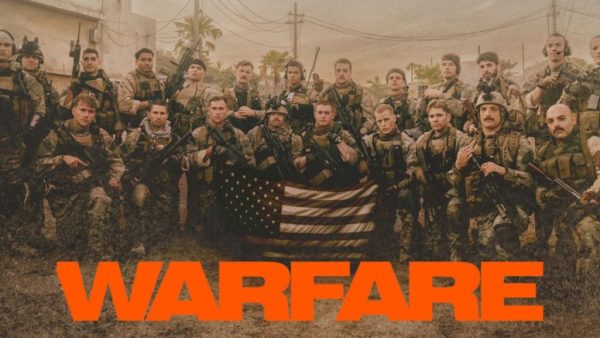 via A24
via A24
Ray Mendoza and Alex Garland’s “Warfare” might frustrate audiences expecting the explosive heroics of a traditional war film centering around the U.S. military but that’s not the case. It’s pointless and meandering. Eventful but seemingly uneventful at the same time. But that’s exactly the point — and precisely what makes it so effective.
This isn’t “Saving Private Ryan.” It’s not even “American Sniper.” “Warfare” dares to say what most films about conflict gloss over: that war, for the most part, is boring and, well, pointless.
Its long beginning stretch of nothing, broken up by the glooming tension, begs the audience to wonder one question at the end of the film: Why?
Mendoza and Garland unearth a deeper, more haunting truth — the essential meaninglessness of it all.
Only one person is killed by gunfire in “Warfare”: a native Iraqi, shown in a blink-and-you’ll-miss-it shot, a moment so devoid of cinematic glory it feels like an afterthought. A moment in the film that highlights the film’s quiet thesis. War doesn’t have a climax. It doesn’t have a moral arc. It doesn’t even need a name for its casualties. Most of the gunfire in the film isn’t even aimed at anything specific — it’s cover fire, not intent.
You, much like the soldiers, don’t see where they’re aiming at. The gunfights don’t seek targets so much as they express the panic, fear, and procedure that comes with situations like the one taking place in the film.
In that sense, “Warfare” serves as an act of cinematic restraint. It holds back from indulging in the spectacle heroism of battle, instead showing the cold, impersonal side of war as it really is. There are no heroic arcs here, no great victories or final sacrifices. Just the reality of needless lives being lost for nothing. There’s no tangible objective for the soldiers in the film and the action only starts after some time of waiting, and waiting. The violence, when it does occur, is disorienting and is closer to a blur than a set piece.
That is not to say that certain aspects of the film aren’t technically marvelous because they are. For a budget of $20 million, the sound design and practical effects are off the charts good. So well done that you feel every explosion that goes off rattle through the bones in your body as you watch this film.
Yet despite this deliberate approach by Mendoza and Garland, “Warfare” has been met with critiques accusing it of being military propaganda — frankly a strange and shallow misreading for a film that feels, if anything, like anti-propaganda, a film closer to being a horror movie than an action-adventure The discomfort it inspires doesn’t come from glorifying war but from how honestly it refuses to do so. There’s no heroism here. No righteousness. Just absurd pointlessness more than anything.
And this honesty is no accident. Co-director Ray Mendoza is a veteran himself, and “Warfare” draws directly from his real-life experience.
The film itself is essentially a reenactment of a real battle Mendoza was a part of in the Iraqi city of Ramadi all derived from Mendoza’s memories. Every SEAL in the film is based on the real-life counterparts that fought alongside Mendoza in the battle that took place in 2006. Ray Mendoza himself is portrayed in the film by D’Pharoah Woon-A-Tai in one of his first major roles.
These aren’t imagined scenarios — they’re reconstructed memories and the tagline of the film being “Everything is based on memory” showcases this further.
To call the film propaganda is to ignore that this is a veteran reckoning with the very system he was once a part of. If anything, it’s a deconstruction, a refusal to mythologize what so many films before it have. That’s what makes “Warfare” so bold from other films in its genre: it captures the existential weight of being a part of something so vast, so violent, and so void of really any meaning.
The war in Iraq–the same one in the film–further proves to have been completely and utterly pointless. Nonetheless the war machine churned on, indifferent to clarity or purpose and with that Mendoza and Garland don’t offer a message of hope or resolution, instead they offer the audience a mirror. And what we see reflected isn’t triumphant, it’s tragic and blank.
“Warfare” isn’t about what happens. It’s about what doesn’t. And in that absence, it tells a quiet, devastating truth — about war, about memory and about meaning. In doing so, it becomes one of the most radical, restrained and deeply personal war films in recent memory.



James • Apr 24, 2025 at 1:09 pm
call on me scene got me hyped, just for me to be terrified in the end
Graham • Apr 24, 2025 at 1:03 pm
You nailed it, a great dissection of the movie and what it actually portrays. Absolutely loved this movie as it tells a different side of war and the harsh reality that the public doesn’t realize. Great read and good job on the article!